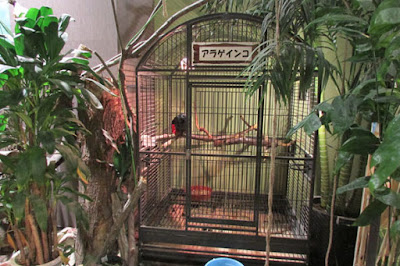“A
zoo in a SHOPPING MALL?” I knew that Japan Moriyama City , Shiga
Prefecture
The
collection occupies about the same amount of floor space as a medium-sized
restaurant or clothing store, and true to its name, this animal collection
allows visitors a great deal of physical contact with many of the resident
animals. And although the animal species
in this collection might have been chosen for their tolerance of human contact,
the amount of contact that occurs here might very well exceed acceptable limits.
The area immediately inside the entrance was crowded with dogs, rabbits, chicks, turtles, caged birds and even a small monkey. Most of the “exhibits” were built to allow small children unfettered access to the animals. Predictably, small children end up handling the animals extensively – sometimes like toys. I observed one little girl trying to see how many chicks she could carry at one time.
There were a number of birds and small animals in small cages.
The
amount of space allowed to this goat was about equal to a king-sized bed.
The
monkey constrained to this small cage was enough to tear at one’s heartstrings…
…especially
when he tried to tear at my camera strap.
Proceeding
to the inner part of the “zoo”, the area was decorated to resemble a jungle.
There
was a Canadian wildcat.
This
alligator had a small pool to himself.
It housed a young lion.
This 50-centimeter wide glass corridor allowed visitors to get very close to the lion.
There were many animals in glass tanks.
Snakes
Turtles
Armadillo
Hedgehogs
There was a line-up of birds along a wooden wall.
Ropes attached to their legs kept them restrained to their wooden perches.
Other animals restrained by leashes: owl
Meerkat
Squirrel
monkey
Sign
warning that the squirrel monkey might bite.
The Freemovers
Some animals were not
restrained, and I was amazed that they did not try to run away. Perhaps they simply did not know in which direction
they should run.
Bat
Mara
(Patagonian Cavy)
For
me, visiting this collection turned out to be a strange experience. Forget about immersion exhibits resembling
natural habitats – entering this “zoo” was an immersion of a different kind. So many visitors and so many animals crammed
into such close quarters. Petting
zoo? Pet shop? I still don’t know how to best describe or
classify this bizarre collection.
Admission
for adults was 1000 yen. Admission for
children from 3 years old up to intermediate school was 600 yen. Children 0, 1, and 2 years old were admitted
free.
(Note:
All photos taken in this post were taken during a visit on August 17, 2015. The comments in this post are based on
observations made on that day. Conditions
may have since changed.)
...............................................................................................................................................
UPDATE: This facility closed on January 15, 2019
The shopping mall management apparently decided to end the contract for the space which the zoo occupied. It is notable that there were considerable complaints about the facility from groups concerned about animal welfare. Some of these concerns were detailed in a June 4, 2017 online news article (Huffpost Japan edition) which referenced an open wound on the head of the lion.
...............................................................................................................................................
UPDATE: This facility closed on January 15, 2019
The shopping mall management apparently decided to end the contract for the space which the zoo occupied. It is notable that there were considerable complaints about the facility from groups concerned about animal welfare. Some of these concerns were detailed in a June 4, 2017 online news article (Huffpost Japan edition) which referenced an open wound on the head of the lion.



























































